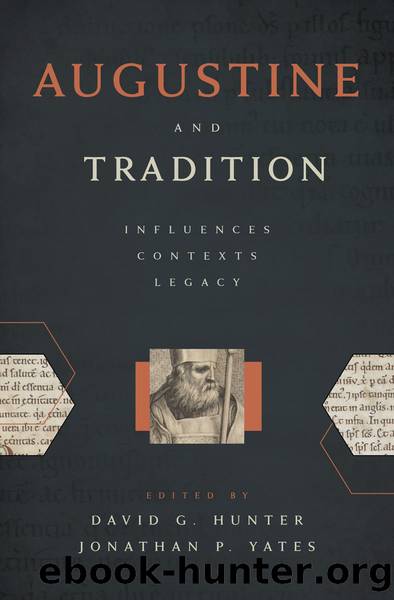Augustine and Tradition by David G. Hunter;Jonathan P. Yates;

Author:David G. Hunter;Jonathan P. Yates;
Language: eng
Format: epub
Publisher: INscribe Digital
Published: 2021-01-15T00:00:00+00:00
CONCLUSION: PAST, PRESENT, AND FUTURE
Augustine was, like many people at other times and in other places, âforever caught up in the flow of the current moment, not just freighted with the icy inventory of the past.â103 His moment was one characterized by the significant cultural realignments that accompanied Christianityâs recent rise to social and political prominence, transformations initiated decades earlier by Constantineâs choices and policies but accelerating rapidly during Augustineâs Theodosian age. For almost all of Augustineâs career-minded and ambitious Western contemporariesâregardless of their religious affiliationsâthe past was an imaginative realm textured above all else by the works of those canonized Latin authors who dominated the school system through a pedagogy that rewarded verbal fluency and prioritized the enarratio poetarum. Christians, like the son of Monica and Patricius, had no viable alternative. Certainly, over time and as circumstances dictated, Augustine added new texts and authors to his âclassical reading,â searching out other poets (Lucretius, Persius, Horace, and Lucan), digesting Ciceroâs philosophical and political dialogues, delving into the books of the Platonists (as well as the books of the Manichaeans), and reading intently Livyâs history Ab urbe condita. And he discovered other pasts stored away in Christian scripture and within the pages of earlier Latin Christian writers such as Tertullian and Lactantius, men who had in like mannerâthough in a different ageâobserved the world from a cultural divide. Yet the tally of Augustineâs testimonia stands witness to the abiding influence of his school days, as teacher as well as student. As the tides of dilemma, debate, and controversy swirled within and around him, Vergil and Cicero were seldom long absent from his thought. As he scanned the immediate and far reaches of the future, those authors continued to cast light forward.
Consequently, during his last years, mired in acrimonious debate over concupiscence and original sin with the glib Julian of Eclanum, for whom Paulinus of Nola had once penned a wedding poem thoroughly scrubbed of the old gods,104 Augustine would have recourse again to the larger-than-life figures who had been his companions for so many decades. In the fourth book of the Contra Iulianum (c. Iul.), Cicero and Sallust, Terence and Vergil all reappear.105 Hortensius was called into service to rebut Julianâs own âcrowd of philosophers.â106 Vergil was quoted to verify the difference between basic hunger (fames) and an extravagant love of eating (edendi amor).107 Certainly, here as elsewhere scriptural citations outweigh Augustineâs classical allusions and quotations, but the very presence of the latter in the Contra Iulianum is witness to their abiding influence on Augustineâs patterns of thought. In this sense, his exchange with the Christian Julian of Eclanum overlaps his earlier debate with the cultivated pagan Nectarius of Calama, against whose claims of (misplaced) patriotism Augustine enlisted both Cicero (via Rep.) and that âmost illustrious poet of your literature.â108 The possessive adjective (uestrarum) may have been intended to distance Augustine safely from Vergil, but it belies just how long and how profoundly the Aeneid spoke to Augustine of values and ideas whose vibrancy seems never to have dulled.
Download
This site does not store any files on its server. We only index and link to content provided by other sites. Please contact the content providers to delete copyright contents if any and email us, we'll remove relevant links or contents immediately.
| Central Africa | East Africa |
| North Africa | Southern Africa |
| West Africa | Algeria |
| Egypt | Ethiopia |
| Kenya | Nigeria |
| South Africa | Sudan |
| Zimbabwe |
Goodbye Paradise(2982)
Men at Arms by Terry Pratchett(2410)
Tobruk by Peter Fitzsimons(2068)
Pirate Alley by Terry McKnight(1914)
Arabs by Eugene Rogan(1844)
Borders by unknow(1792)
Belonging by Unknown(1474)
The Biafra Story by Frederick Forsyth(1329)
It's Our Turn to Eat by Michela Wrong(1308)
Botswana--Culture Smart! by Michael Main(1242)
A Winter in Arabia by Freya Stark(1227)
Gandhi by Ramachandra Guha(1199)
Coffee: From Bean to Barista by Robert W. Thurston(1185)
Livingstone by Tim Jeal(1155)
The Falls by Unknown(1143)
The Source by James A. Michener(1139)
The Shield and The Sword by Ernle Bradford(1105)
Egyptian Mythology A Fascinating Guide to Understanding the Gods, Goddesses, Monsters, and Mortals (Greek Mythology - Norse Mythology - Egyptian Mythology) by Matt Clayton(1091)
Africa: Altered States, Ordinary Miracles by Richard Dowden(1082)
